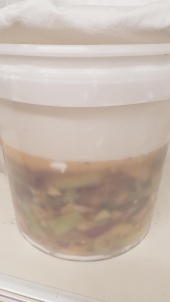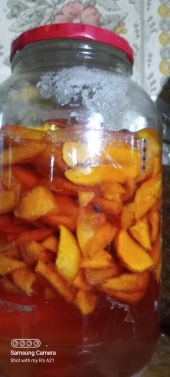




Trust in the Lord but always lock your bicycle




-




Trust in the Lord but always lock your bicycle




-




Trust in the Lord but always lock your bicycle





 1
1




Jambo Reece wrote:I didn't look closely at the fly, but the fly that landed in the hard cider looked a little bigger, so i was wondering if it was a different fly that had brought a different bacteria. Anyway, as you say, if this is perfectly normal I shall wait it out a few more weeks. Just seems odd that the other batch with apple juice doesn't have that smell. Well, I know there are a lot of different bacteria out there. I wonder if another type took hold. By the way, it's been probably 6 weeks now, both were really slow to get innoculated, and that film on the top is certainly not a "mother" yet. Really thin film of bacteria.
It's interesting what you say about fermenting the juice in an airlock first. I was questioning this in general with vinegar before. It seems that some vinegars like wine vinegar is made from the alcoholic fermented product, and yet, at least in England, ACV is always made from neat apple juice. I've never seen a recipe that says ferment it to hard cider first. Same way malt vinegar isn't made from sprouted barley mash, but rather the alcoholic ale they produce first.
As far as I'm aware the only difference is that when you do it from the base sugar liquid e.g. apple juice in this case, the yeast and bacteria live in there smilutaneously, and as asoon as the yeast eats the sugars and turns it to alcohol, the acetobacter living alongside them then turn it into vinegar. Whereas with wine vinegar, and the method you suggest, the human ferments to alcohol first, and then lets the acetobacter at it. But the process is identical.
So, what does it matter which way you do it, and why is red wine vinegar never made from grape juice? This is why I did a batch of apple juice and cider vinegar so see if there was any difference.
You got me on my rant now!
-




Trust in the Lord but always lock your bicycle









Jambo Reece wrote:How did you learn your process then henry jabel?
Was it in a book or from a friend?
If you google "making apple cider vinegar", every single link on the web shows them making it from apple juice directly, and not cider.
The irony here of course is that it's the cider one that is smelling cheesy

-




Trust in the Lord but always lock your bicycle









Jambo Reece wrote:Some random bacteria or mold must have taken hold as you can see from the photo. It really was ponging, and I sampled some from below the mold. It tasted watery, so I know it has started to break down. Just one of those things I guess.
Not trying to be argumentative Henry, I'm just inquisitive as to the difference. Thanks for those links, and if that is true in the States, then it must be a difference in our cider makers, because I can asure you there are plenty of Brits making it straight from the fruit juice. Anyway, that's good to know. I would imagine as you said it may well be faster to do it in a two stage process, and certainly is more controlled, and may make a more complete ferment.
But am I right in saying that in principle, it shouldn't make any difference whether you do a two stage or one step process? Same sugars, same yeast, same bacteria, just done in a different order
Cheers
-




Trust in the Lord but always lock your bicycle
 1
1




Living free starts with understanding ones own emotions and emotion affects and controls us.

|
Hey, I'm supposed to be the guide! Wait up! No fair! You have the tiny ad!
Learn Permaculture through a little hard work
https://wheaton-labs.com/bootcamp
|



